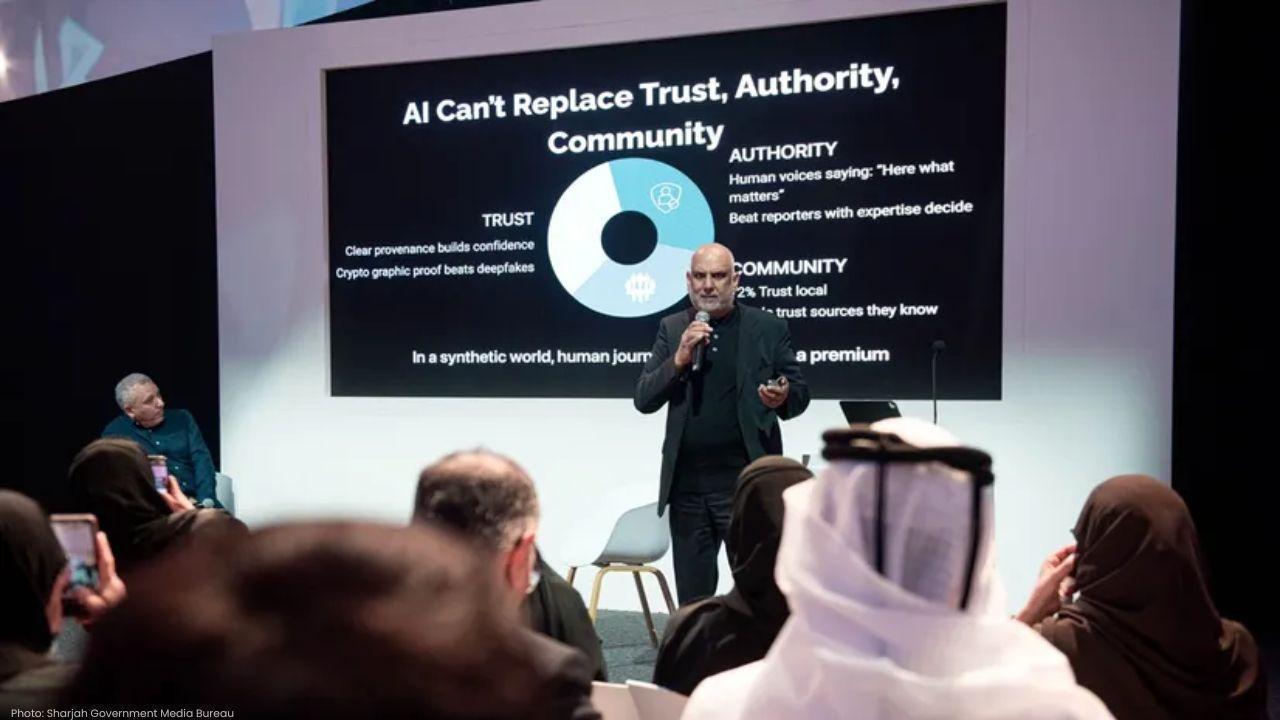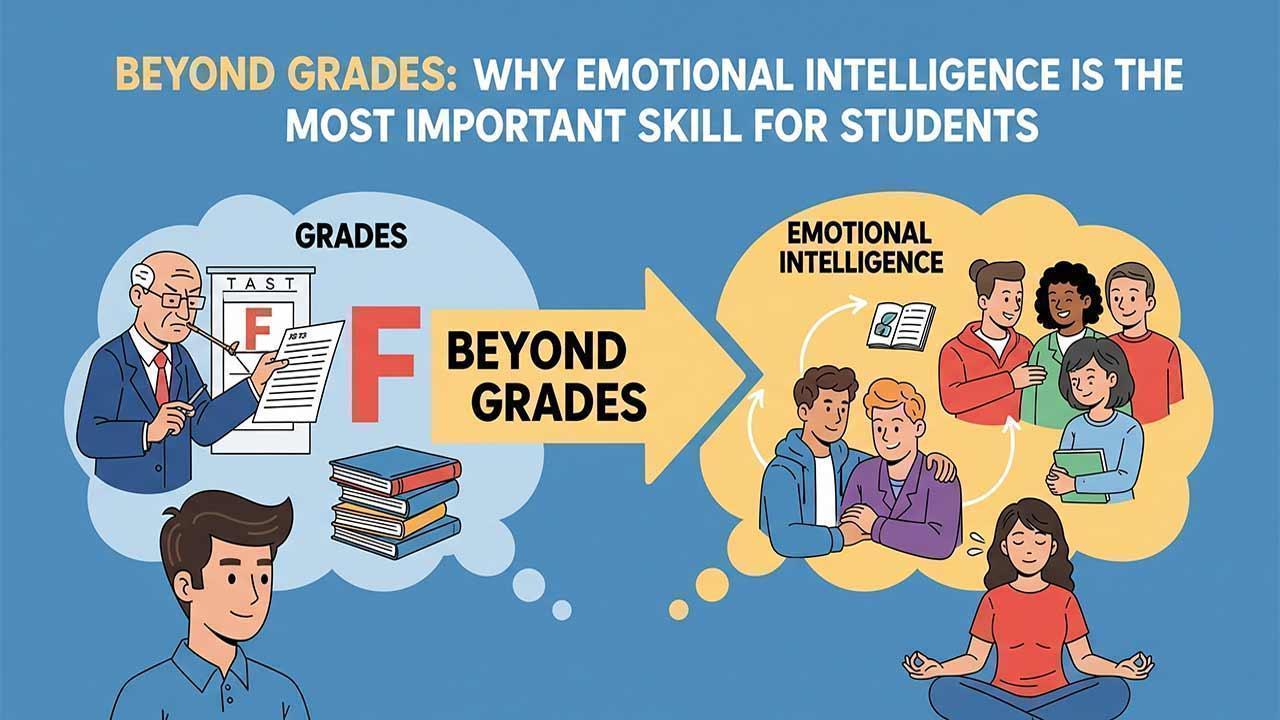
Post by : Layla Badr
The world of journalism is changing fast. With the rise of artificial intelligence (AI), newsrooms around the globe are facing questions that were unimaginable a few years ago. On the first day of the 14th annual International Government Communication Forum (IGCF) in Sharjah, journalists, experts, and media enthusiasts gathered to discuss a pressing question of our time: What happens to journalism in the era of AI? Will AI take over journalism jobs, or will humans continue to lead the storytelling process?
A special session titled “Journalism vs. Artificial Intelligence: Humans or Machines?” was organised by the Sharjah Press Club. The session featured two prominent experts: Hussam Al-Najjar, Leader of SAP Digital Transformation, and Simon Thethi, a tech entrepreneur, product innovator, and media pioneer. The discussion explored the current capabilities of AI, its growing presence in newsrooms, and the potential risks it poses to journalism’s credibility.
Stay informed with the latest news. Follow DXB News Network on WhatsApp Channel
How AI is Changing the Newsroom
Hussam Al-Najjar highlighted the rapid growth of AI in the past few years. He pointed out that in just two years, leading AI models have improved drastically, achieving over 80% accuracy on PhD-level science questions, compared to around 30% previously. This shows that AI is learning and evolving at a remarkable pace.
Al-Najjar shared a recent study that revealed 81.7% of journalists used AI tools in their work by 2024, while 87% of newsroom managers in 2025 said AI had completely or partially changed newsroom operations. This indicates that AI is no longer a distant concept—it is now an active part of many newsrooms.
AI is being used for a wide range of tasks, including:
Summarising articles to provide quick insights.
Transcribing interviews and speeches accurately and quickly.
Researching information from large databases that would take humans days to review.
Creating multi-format content, like text, video, and graphics.
Al-Najjar explained that AI is becoming the “brain of the newsroom,” similar to the computer in the famous series Star Trek. Future scenarios could include fully AI-powered editorial systems, personalised news delivery, and the ability to produce content in various formats quickly.
However, he cautioned that with great power comes great responsibility. “Journalism is already facing challenges with public trust. If the media relies heavily on AI, people may start questioning the credibility of news,” Al-Najjar said. He emphasised that AI is not the enemy of journalism. When used responsibly, it can increase efficiency and relevance, helping journalists focus more on creative and investigative work.
The Risks: Can AI Replace Human Trust?
Simon Thethi presented a more cautious perspective. He pointed out the rapid growth of AI-generated content across the internet. Since the launch of ChatGPT in 2022, AI-generated content has increased by 8,300%, and today, 74% of all websites reportedly use AI to create content.
Thethi warned that such growth comes with serious consequences. The rise of fake news and low-quality content is causing people to lose trust in online information. Surveys show that 58% of people no longer trust online news, and nearly 90% of journalists believe AI may increase the spread of disinformation.
“AI cannot go into the field, meet people, or build relationships like a human journalist can,” Thethi explained. For example, a conflict journalist reporting from war zones gains credibility and authority through real human interaction, which AI cannot replicate. Trust, empathy, and human judgment are irreplaceable qualities in journalism.
AI as a Tool, Not a Storyteller
Despite his concerns, Thethi acknowledged that AI has useful applications in newsrooms. He compared AI to a “digital intern” that can help with tasks like:
Transcription of interviews.
Translation of foreign language content.
Processing large amounts of data quickly.
He cited Reuters as an example, where the integration of AI increased newsroom efficiency by 30%. This shows that AI can support journalists in handling repetitive tasks, giving them more time to focus on investigative and human-centered reporting.
However, Thethi drew a clear boundary: AI should never replace human storytelling. “When content becomes synthetic, mass-produced, and fake, it undermines the very purpose of journalism,” he said. Journalism stands out because of human-created content that conveys authority, credibility, and empathy—qualities AI cannot produce.
Finding the Right Balance
The session concluded with an important takeaway: the future of journalism is not about choosing between humans or machines. Instead, it is about finding a careful balance, where AI supports journalists, but human judgment and empathy remain at the core of news reporting.
Journalists will need to adapt to AI tools while maintaining the trust of their audience. They must ensure that technology enhances accuracy and efficiency without compromising ethical standards or the human touch that makes journalism valuable.
About the Forum: IGCF 2025
The 14th annual edition of the International Government Communication Forum (IGCF) is held under the theme “Communication for Quality of Life”. This year, the two-day forum has brought together more than 237 international speakers, featuring 51 sessions and over 110 activities, including seven inspiring talks and 22 workshops across 22 interactive platforms.
The programme focuses on five global priorities:
Food Security
Public Health
Education
Environmental Sustainability
Green Economy
The forum is supported by 30 partners, including government bodies, research centres, technology companies, and media organisations. It is produced by the Sharjah Government Media Bureau (SGMB).
The IGCF session on journalism and AI highlighted both opportunities and risks. AI can streamline workflows, process vast data, and support journalists, but it cannot replace human trust, empathy, and credibility.
As Hussam Al-Najjar and Simon Thethi emphasised, the future of journalism lies in using AI responsibly. Newsrooms must integrate technology without losing sight of the human values that make journalism meaningful. Only by maintaining this balance can journalism continue to serve society, inform the public, and remain a trusted pillar of democracy.
The debate at IGCF 2025 reminds all journalists and media professionals: AI is a powerful tool, but storytelling, authority, and empathy remain distinctly human strengths.

Beyond Grades Why Emotional Intelligence is the Key to Students Success
Discover why emotional intelligence matters more than grades helping students succeed manage emoti

Chinese Woman Pays Rs 27 Lakh After Boyfriend’s Death
A Chinese woman pays Rs 27 lakh to her boyfriend’s family after he jumped from her moving car during

DMCC Partners with Korea’s NIPA to Boost AI & Startups
DMCC signs a strategic deal with Korea’s NIPA to expand AI, tech startups, and trade opportunities b

Sheikh Hazza Receives Abu Dhabi Heritage Authority Delegation
Sheikh Hazza meets Abu Dhabi Heritage Authority to discuss projects preserving Al Ain’s heritage, cu

Global Banking 2025: Transformations, Challenges, and UAE’s Strategic Role
Transformations, Challenges, and UAE’s Strategic Role

Tina Charles Wins Dawn Staley Award, Inspires Beyond Court
Tina Charles wins Dawn Staley Award for her leadership and community work. Her Hopey’s Heart Foundat

Google AI Plus: Affordable Access to Advanced AI Tools
Google launches AI Plus, a budget-friendly subscription offering Gemini 2.5 Pro, video tools, Worksp

Beyond Grades Why Emotional Intelligence is the Key to Students Success
Discover why emotional intelligence matters more than grades helping students succeed manage emoti

Global Banking 2025: Transformations, Challenges, and UAE’s Strategic Role
Transformations, Challenges, and UAE’s Strategic Role

Israel Launches Airstrikes on Yemen — 35 Dead, Over 130 Injured in Sanaa and Al Jawf
Emergency teams rush to rescue survivors as strikes hit military sites, fuel depots, and residential

Charlie Kirk Shot Dead at Utah University During Speech
Charlie Kirk, Turning Point USA founder, was shot dead at Utah Valley University. Chaos erupted as t

UAE President Hosts Ceremony for New Ambassadors
UAE President Sheikh Mohamed bin Zayed attends swearing-in of UAE ambassadors and receives credentia

UAE Civil Aviation Soars Airports Flights and Economic Impact
UAE’s civil aviation sector grows rapidly with world-class airports, international routes, cargo job

Barakah Nuclear Plant Completes One Year of Full UAE Power Supply
Barakah Nuclear Plant marks one year of full operations, providing 25% of UAE electricity and cuttin

GCC launches unified 2025 guideline to boost investor relations
A new GCC-wide 2025 Investor Relations Guideline aims to unify practices, strengthen transparency an